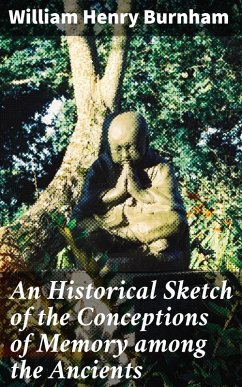William Henry Burnham's "An Historical Sketch of the Conceptions of Memory among the Ancients" offers a profound exploration of the evolution of memory as understood by ancient civilizations, weaving together philosophical, psychological, and literary insights. Employing a scholarly yet accessible style, Burnham traces the multifaceted concept of memory from early philosophical thinkers like Plato and Aristotle to the rhetorical practices of Roman orators. His meticulous research situates these ancient perspectives within the broader context of classical thought, underscoring how cultural views of memory shaped both personal identity and collective history. Burnham, a noted scholar in the fields of psychology and classical studies, draws from his extensive academic background and his interest in the intersection of memory and cognition. His thorough understanding of ancient texts and their implications for contemporary thought sheds light on the importance of memory in human experience. As he highlights the rich tapestry of thought surrounding memory, Burnham reflects on how societal values and philosophical inquiries have influenced conceptions of the mind. This book is a must-read for anyone interested in the intricate relationship between memory and identity, as well as for scholars seeking to engage with the foundations of cognitive theory. Burnham'Äôs work not only illuminates ancient perspectives but also offers valuable reflections that resonate within modern discourse on memory and cognition.
Dieser Download kann aus rechtlichen Gründen nur mit Rechnungsadresse in A, B, BG, CY, CZ, D, DK, EW, FIN, F, GR, H, IRL, I, LT, L, LR, M, NL, PL, P, R, S, SLO, SK ausgeliefert werden.









